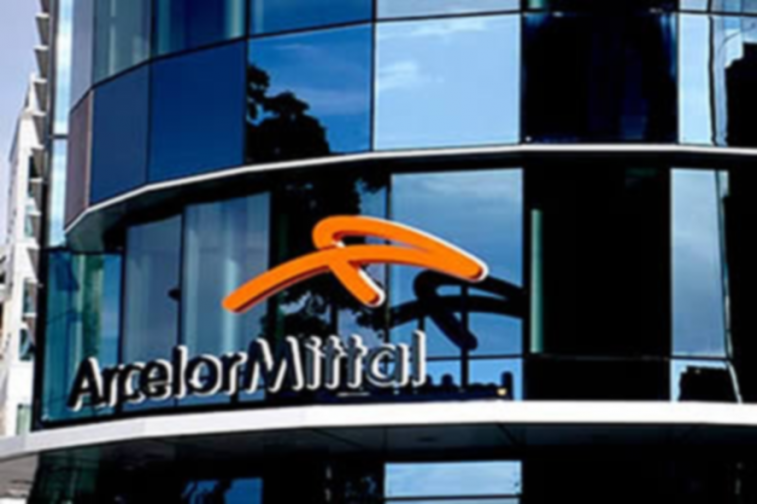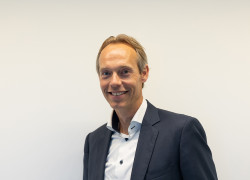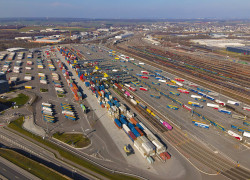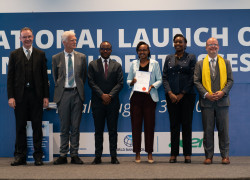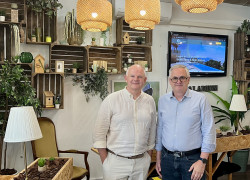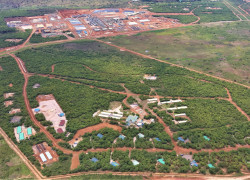ArcelorMittal Europe CEO calls on the European Parliament to help save European steelmakers’ decarbonisation projects threatened by uncertainty
Speaking at the multisectoral business federation FEDIL’s annual reception in Luxembourg, which was attended by Luxembourg’s Prime Minister Xavier Bettel, Geert Van Poelvoorde, CEO ArcelorMittal Europe and President of EUROFER, spoke on the urgent topic of the decarbonisation of European steelmaking and the many uncertainties that the sector faces.
Mr. Van Poelvoorde explained in detail what ArcelorMittal Europe has already done to decarbonise to date, and what it will take to move to the next, crucial phase:
“Building zero-carbon emissions steel plants across ArcelorMittal Europe means replacing the blast furnaces with DRI plants, and building electric furnaces powered by renewable energy. Replacing the natural gas with green hydrogen in the DRI plants – once green hydrogen is available at scale, and at a competitive price - will bring our CO2 emissions down by 90%. And the remaining CO2 emissions will be captured and either stored or used.
“We have a detailed plan to do this and are ready to roll out this plan; we have the investment support of the Belgian, French, German and Spanish governments, and are preparing as much as possible, while we await funding approval from the European Commission – we submitted applications for funding, on time, last summer but are still waiting for a decision.”
Speaking in his EUROFER capacity, he added that across Europe more than 60 industrial scale projects are about to be launched by steelmakers - potentially reducing the European steel industry’s CO2 emissions by 81.5 million tonnes by 2030: “That matches the annual CO2 emissions per capita of around 13 million Europeans – or more than the populations of Belgium and Luxembourg combined.
No other energy-intensive industry has set out such ambition.”
‘Votes will decide the future of steel in Europe’
Ahead of votes on the ETS revisions in the environment committee of the European Parliament next week, and a plenary vote in early June, Mr Van Poelvoorde said: “The situation is very serious, and urgent. With the revised ETS that’s on the table today, even after the whole European steel sector has cut CO2 emissions by 30% and invested €31bn in capex and €55bn in opex, the European steel sector will be paying €8.4bn a year in CO2 costs in 2030 - at a time when we will still be investing heavily in the transition phase from blast furnace-based steelmaking to DRI-EAF steelmaking.”
Linked to the ETS, he also spoke about the proposed carbon border adjustment mechanism: “We welcome this idea, and indeed we need assurance that imports will be subject to the same CO2 cost as European producers. As it is currently proposed however, the carbon border adjustment will not do this. Instead it will create a situation where European steel will be uncompetitive in the global market.
We will simply not have a market for our high cost, low-emissions steel, without a level playing field.”
The industry needs a transition period
Addressing critics of the steel industry who argue that the proposed ETS reforms are needed to accelerate decarbonisation, he explained that the industry needs a transition phase to allow time to transform steelmaking sites: “Replacing blast furnaces with DRI-EAF plants takes years – after the engineering phase, we need two years for the building phase, followed by a period of testing and commissioning. For each of our planned DRI-EAF projects, we will transform an existing industrial site through brownfield investment. We therefore need a transition phase. This will allow us to continue producing via the blast furnace route – making steel in Europe and generating funds that we can
reinvest building the new plants that we need for carbon-neutral steelmaking.”
Crucial need for renewable energy at scale
Access to affordable renewable energy at scale is one of the crucial pillars of carbon-neutral steelmaking – and Mr Van Poelvoorde explained why: “By 2030 the European steel industry will need 150 TWh of renewable electricity from the grid, of which half will be needed for the production of hydrogen. This is double the total electricity consumption of Belgium in 2020. Europe must accelerate the creation of a regulatory environment for green hydrogen (storage, transport); push the building of infrastructure and accelerate the permitting.”
The importance of a secure supply chain
He also reminded the audience of the importance of a secure supply chain. “Just last month, Ursula Von Der Leyen said: ‘Every euro we invest in renewables and energy efficiency is a down-payment on our future energy independence’ – and the same could be said of Europe’s steel industry. Every euro invested in carbon-neutral steelmaking in Europe, is a down-payment on a healthy supply chain for Europe’s long-term prosperity. Steel is strategic, it’s part of the critical value chain – there’s no doubt that these value chains will be significantly weakened, if steelmaking moves outside Europe.”
Communiqués liés
RSA launches technology and management liability insurance s...
RSA Luxembourg, part of Intact Insurance Specialty Solutions, today announces th...
Lancement d'une nouvelle connexion intermodale entre Bettemb...
CFL multimodal a le plaisir d'annoncer le lancement de sa nouvelle connexion i...
Experts from LUNEX award first micro-credentials in Rwanda o...
The Rwanda Ministry of Education (MINEDUC) formally inaugurated Syllabi, a publi...
ERG Notes that ENRC Secures Landmark Victory as Court of App...
Eurasian Resources Group (ERG), a leading diversified natural resources group he...
LetzToken et La Vie est Belle annoncent leur partenariat ouv...
«?LetzToken?», plateforme de tokenisation pionnière basée à Luxembourg, et ...
ERG announces a Pre-Export Finance Facility Agreement based ...
Eurasian Resources Group (“ERG”, “The Group”), a leading diversified nat...
Il n'y a aucun résultat pour votre recherche

